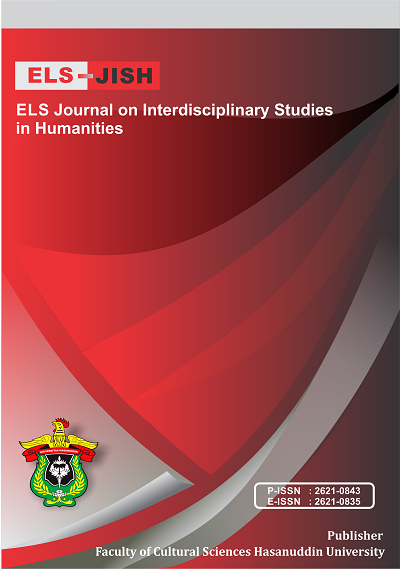The Effectiveness and Students’ Perceptions on Learning Tenses Through Mind Mapping Technique on Elementary Level at an Education and Training Institute in Indonesia
DOI:
https://doi.org/10.34050/elsjish.v4i1.13360Keywords:
Effectiveness, Perceptions, Student, Tenses, Mind Mapping TechniqueAbstract
Numerous studies had conducted the use of mind mapping as a technique in teaching and learning English, but relatively few of these studies focused on the effectiveness and students’ perceptions of mind mapping technique in learning tenses on elementary level in a non-formal education institution. This study aimed to investigate the effectiveness of mind mapping technique in learning present tenses and students’ perceptions toward this technique on elementary level students of the English program. 30 students of the English program on elementary level at Aliah Education and Training Institute Makassar took part in the study. Data were collected through pre-test, post-test, observation, questionnaire, and interview and thus used to analyze the results quantitatively and qualitatively using preliminary studies, general mean scores, and percentages of students‘ improvement score. Results of the study showed that the students were really enthusiastic to learn with this technique and the atmosphere of the classroom was more enjoyable. In addition, the students’ ability in using tenses was improved after implementing this technique. In the pre-test, the general mean score of the students was 42.33 and classified as Very Poor. While, the general mean score of the students was 78.92 and classified as Good in the post-test. The students‘ improvement score was increased up to 86.44%. It revealed that mind mapping technique is effective in learning tenses. However, it is suggested that further studies can be conducted with larger data to make it more accurate and applicable.
References
Aswad, M., et al (2019). A Software to Increase English Learning Outcomes: An Acceleration Model of English as the Second Language. The Asian EFL Journal 26 (6.2.2019), 157-169.
Brown, H.D. 2001. Teaching by Principle: An Interactive Approach to Language Pedagogy. Longman, 2nd ed.
Buzan, Tony. 2013. Buku Pintar Mind Map. Jakarta: Gramedia Pustaka Utama.
Junaidi, J. (2020). ICT Usage in Teaching English in Pekanbaru: Exploring Junior High School Teachers’ Problems. International Journal of Advanced Science and Technology 29 (3), 5052 - 5063
Nahliah, & F Rahman, F. (2018). Glossophobia in Training of Speech. ELS Journal on Interdisciplinary Studies in Humanities 1 (1), 28-36
Olivia, Femi. 2013. 5-7 Menit Asyik Mind Maping Kreatif. Jakarta: Elex Media Komputindo.
Priyadisudiarja, Y., & Purwaningsih, Y.S. 2014. Pintar Bahasa Inggris dengan Mind Map. Yogyakarta: Kawah Media.
Rahman, F. (2017). The Strategy of Teaching Literature Through Language-Based Method: A Communicative Approach. Annual Seminar on English Language Studies 2, 156-170
Rahman, F. (2018). The Constraints of Foreign Learners in Reading English Literary Works: A Case Study at Hasanuddin University. Journal of Arts & Humanities (JAH) 7 (02, 2018), 01-12.
Riski, H., et al. (2018). Improving The Students’speaking Ability Through Silent Way Method At Smu Negeri 12 Makassar. JURNAL ILMU BUDAYA 6 (2), 303-312.
Windura, Sutanto. 2013. 1st Mind Map. Jakarta: Elex Media Komputindo.
Wishon, G.E & Burks, J.M. 1980. Let’s Write English. New York: American Book Company.
Junaidi, J., Hamuddin, B., Simangunsong, W., Rahman, F., & Derin, T. (2020). ICT usage in teaching English in Pekanbaru: Exploring junior high school teachers’ problems. International Journal of Advanced Science and Technology, 29(3), 5052-5063.
Downloads
Published
How to Cite
Issue
Section
License
Copyright (c) 2021 Nur Alifah Annisa Jumrah, Mirah Azizah

This work is licensed under a Creative Commons Attribution-NonCommercial-ShareAlike 4.0 International License.






